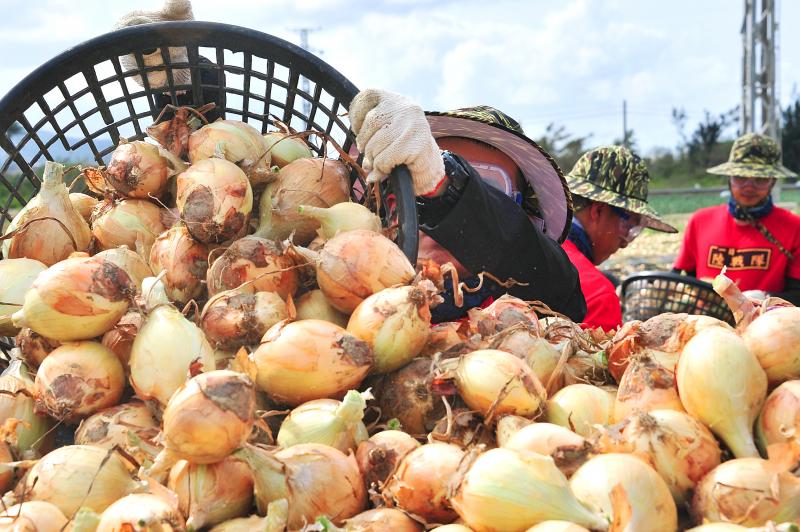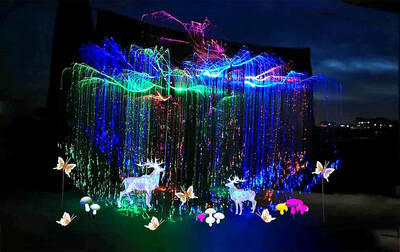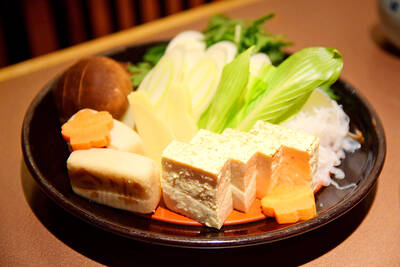Onions, with their sweet aroma, are a popular cooking ingredient, used in both Western and Eastern cuisines. Today, however, information is appearing online suggesting that onions should not be eaten with fish, shrimp, seaweed or honey, as these combinations cause kidney stones. But is there any truth to this? The Taiwan FactCheck Center asked dieticians and experts and confirmed that this information was false. Onion loving foodies everywhere can breathe a sigh of relief.
According to information on certain social media platforms, onions should not be eaten together with fish, as the fish has a high protein content, and the oxalic acid in the onion will break down and destroy the protein in the fish and make it form a precipitate that is not easily absorbed by the human body.
The rumor that onions should not be eaten with shrimp suggests that the calcium oxalate formed by the shrimp produces kidney stones, while the problem with eating onions with seaweed apparently comes from the large amounts of iodine and calcium found in the seaweed, which can easily form stones due to the oxalic acid in the onions. Finally, there are rumors saying that eating onions with honey can be bad for the eyes, and can lead to impaired vision or blindness.

Photo: Tsai Tsung-hsien, Liberty Times照片:自由時報記者蔡宗憲
After consulting dieticians and experts, the FactCheck center was able to disprove these rumors.
According to Lee Pei-ni, director of the Department of Nutrition at Taipei Hospital, if one consumes large amounts of food containing oxalic acid, the body’s ability to absorb protein can be impaired. Onions, however, are not rich in oxalic acid, and people do not normally consume large amounts of onions in their meals (say, eight onions every meal continuously for a whole month), and therefore the situation indicated in the rumors is unlikely to happen.
So, what about the rumor saying that eating onions together with shrimps or seaweed will lead to the formation of calcium oxalate, and thus to the formation of kidney stones? According to Lee, there are many factors contributing to the formation of stones, and a person in a normal state of health will not develop kidney stones from eating specific types of food. The old wives’ tale that one should not eat spinach with tofu, for example, carries little water.
Lee adds that, even though stones have a lot of calcium in them, that doesn’t mean that eating foods containing calcium and oxalic acid will be a major contributing factor to the formation of stones, which is more likely the result of the individual’s constitution or hereditary factors. It is sufficient for normally healthy people to maintain a balanced diet and to make sure they are getting enough food.
On the rumor that onions should not be eaten together with honey, or it could be bad for the eyes and even possibly lead to a loss of eyesight, Lee clarified that onions and honey are both natural foods and that, if eaten as part of a balanced diet, there will be no risk of impaired vision. One thing to bear in mind, however, is that raw onions can be relatively spicy and cause abdominal bloating, and so she recommends that people with relatively sensitive stomachs should eat them sparingly, so that is doesn’t place an overly large burden on the body.
(Translated by Paul Cooper, Taipei Times)
帶著甜味的洋蔥是熱門食材之一,足跡遍佈東西方料理界,但如今,網路上竟有「洋蔥不能和魚、蝦、海帶、蜂蜜一起吃」否則會產生腎結石的訊息,究竟是真是假?台灣事實查核中心求證營養師及專家,證實該消息為錯誤訊息,熱愛洋蔥的饕客大可放心。
社群平台流傳訊息稱,「哪些食物不能和洋蔥一起吃?洋蔥和魚不能一起吃,魚中含有豐富的蛋白質,洋蔥和魚同吃,洋蔥裡的草酸會分解、破壞魚中豐富的蛋白質,使之沉澱,不容易被人體消化吸收。洋蔥和蝦;洋蔥和蝦不能一起吃,蝦形成草酸鈣產生結石。洋蔥和海帶;洋蔥和海帶不能一起吃,海帶裡邊含有豐富的碘和鈣,洋蔥含有草酸,洋蔥和海帶一起吃容易形成結石。洋蔥和蜂蜜;洋蔥和蜂蜜不能一起吃,一起吃對眼睛不好,會引起眼睛的不適,嚴重的還會導致眼睛失明」。經查核中心求證營養領域專家,證實此為錯誤訊息。
針對蛋白質部分,臺北醫院營養科主任李佩霓指出,若攝取大量含草酸食物,食物中的草酸會干擾蛋白質的吸收,但洋蔥為低草酸食物,正常飲食狀況下並不會攝取大量洋蔥(如,一餐吃八顆洋蔥、連吃一個月等),因此不會有傳言所指的狀況。
傳言指出「洋蔥和蝦、海帶一起吃會形成草酸鈣,成為結石」,是否屬實?李佩霓解釋,影響結石形成的因素很多,一般健康狀態的人不會因為吃了特定食物就引起結石,如老謠言「菠菜不能和豆腐同時食用」,此為錯誤觀念。
李佩霓也補充正確觀念指出,結石成分中有許多鈣,但是含鈣與含草酸的食物一起食用,並不是造成結石生成的主因,結石有可能是個人體質或遺傳等原因造成;建議一般人把握均衡飲食、足量飲水的兩大原則即可。
又針對傳言「洋蔥和蜂蜜不能一起吃」否則對眼睛不好、可能釀失明部分,李佩霓澄清,洋蔥和蜂蜜各自都是天然的食物,在均衡飲食的狀況下,不會有失明的風險。唯一要留意的是,洋蔥生食較為辛辣,且容易造成腹部脹氣,建議腸胃較敏感者少量攝取,才不致造成身體過大的負擔。
(自由時報)

The Lantern Festival, celebrated on the 15th day of the first lunar month, is one of the most important traditional festivals in Chinese culture. The word yuan means “first,” and xiao means “night,” referring to “the first full moon night of the lunar year.” In 2026, the Lantern Festival falls on March 3 in the Gregorian calendar. Also known as the Shangyuan Festival or Festival of Lights, the Lantern Festival marks the festive conclusion of the two-week Lunar New Year period. It symbolizes hopes for brightness, peace and reunion in the year ahead. On this day, people traditionally enjoy lantern displays, riddle-guessing

A: Happy Lunar New Year. I wish you joy and health in the Year of the Horse. B: Thanks, you too. Actually, the Harvard Study of Adult Development claims that they’ve finally discovered the secret to living a happy life after 85 years of research. A: What is it? Money? Fame? Career? B: Nope, the key is good relationships. Professor Robert Waldinger, the principal investigator, portrays one’s relationships as “social fitness,” and has worked with the New York Times to launch the “7-day Happiness Challenge.” A: I wanna be socially fit. How can I participate in this challenge? A:

Steam curls from a shallow iron pot as thin ribbons of beef turn from ruby to blush. Warishita — a mixture of soy sauce, sugar and mirin — goes in, and the room fills with a salty-sweet aroma. Tofu slips in beside mushrooms and greens, chopsticks hover and voices soften. More than a hot pot, “sukiyaki” is a table-side ritual that invites everyone to cook and enjoy at the same pace. The name is believed to be associated with the iron “suki,” a kind of spade once used by farmers for cooking and later replaced by shallow pots. As cultural taboos

1. 他沒有看過那部電影,我也沒有看過。 ˇ He hasn’t seen the movie. I haven’t seen it, either. χ He hasn’t seen the movie. I haven’t seen it, too. 註:too 表示「也」,在肯定句中與 also 同義且更口語。too 一般放在句尾,或作為插入語放在句中;also 通常靠近動詞,不放在句尾。例如: He likes chocolate; I also like it. He likes chocolate; I like it, too. 表示「也不」,不可以在否定語的後面用 too,應用 either 或用 nor 表示否定。但口語裡有時為了強調也把 also 放在否定語的前面。例如: He doesn’t like Gone With the Wind; I don’t like it, either. He doesn’t like Gone With the Wind; I also don’t like it. He doesn’t know her phone number; nor do I. 2. 他不難過,我也不難過。 ˇ He was not upset. Neither/Nor was I. χ He was not upset. So was I. 註:承接前句述詞的動作,因而構成新的句子時,新句子的詞序是動詞在前,主詞在後。但應注意:肯定時用副詞 so,否定時用 neither 或 nor。例如: